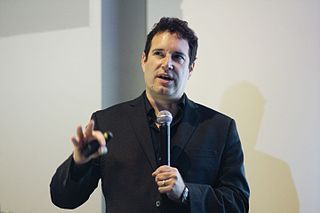A Quote by Jeff Bridges
Technology is such a broad kind of term, it really applies to so many things, from the electric light to running cars on oil. All of these different things can be called technology. I have kind of a love-hate relationship with it, as I expect most people do. With the computer, I spend so many hours sitting in front of a computer.
Related Quotes
The technology that lets many people use the same radio channel at the same time is called smart antenna technology or adaptive array technology or interference mitigation. This technology uses computer processors to take the signals from multiple antennas at each location and sorts the various signals out so they don't interfere with each other.
I love technology. Matches, to light a fire is really high tech. The wheel is REALLY one of the great inventions of all time. Other than that I am an ignoramus about technology. I once looked for the 'ON' button on the computer and came to find out it was on the back. Then I thought, anyone who would put the 'on' switch on the back, where you can't find it, doesn't do any good for my psyche. The one time I did get the computer on, I couldn't turn the damn thing off!
The issues involved are sufficiently important that courses are now moving out of the philosophy departments and into mainstream computer science. And they affect everyone. Many of the students attracted to these courses are not technology majors, and many of the topics we discuss relate to ethical challenges that transcend the computer world.
Every disruptive innovation is powered by a simplifying technology, and then the technology has to get embedded in a different kind of a business model. The first two decades of digital computing were characterized by the huge mainframe computers that filled a whole room, and they had to be operated by PhD Computer Scientists. It took the engineers at IBM about four years to design these mainframe computers because there were no rules. It was an intuitive art and just by trial and error and experimentation they would evolve to a computer that worked.
One of the many, many things I hate about war is how it trivializes the personal. The big themes, the broad sweep, the emergency measures, the national identity, all the things that a particular kind of man with a particular kind of power urge adores, these are the things that become important. War gives the lie to the personal, drowns it in meetings, alarms, sacrifices. The personal is only allowed to return as death.
The dreams of the past - whether it was public TV being rolled into the classroom to teach Spanish, or the film projectors or the videotapes or the computer-aided instruction drill systems - the hopes have been dashed in terms of technology having some big impact. The foundation, I think can play a unique role there. Now, our money is more to the teacher-effectiveness thing, and technology is No. 2, but I'll probably spend more money on the technology things.
The personal computer was a disruptive innovation relative to the mainframe because it enabled even a poor fool like me to have a computer and use it, and it was enabled by the development of the micro processor. The micro processor made it so simple to design and build a computer that IB could throw in together in a garage. And so, you have that simplifying technology as a part of every disruptive innovation. It then becomes an innovation when the technology is embedded in a different business model that can take the simplified solution to the market in a cost-effective way.



































